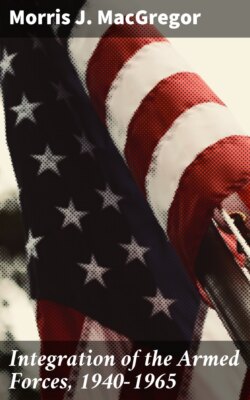Читать книгу Integration of the Armed Forces, 1940-1965 - Morris J. MacGregor - Страница 12
На сайте Литреса книга снята с продажи.
World War II: The Army
ОглавлениеCivil rights leaders adopted the "Double V" slogan as their rallying cry during World War II. Demanding victory against fascism abroad and discrimination at home, they exhorted black citizens to support the war effort and to fight for equal treatment and opportunity for Negroes everywhere. Although segregation was their main target, their campaign was directed against all forms of discrimination, especially in the armed forces. They flooded the services with appeals for a redress of black grievances and levied similar demands on the White House, Congress, and the courts.
Black leaders concentrated on the services because they were public institutions, their officials sworn to uphold the Constitution. The leaders understood, too, that disciplinary powers peculiar to the services enabled them to make changes that might not be possible for other organizations; the armed forces could command where others could only persuade. The Army bore the brunt of this attention, but not because its policies were so benighted. In 1941 the Army was a fairly progressive organization, and few institutions in America could match its record. Rather, the civil rights leaders concentrated on the Army because the draft law had made it the nation's largest employer of minority groups.
For its part, the Army resisted the demands, its spokesmen contending that the service's enormous size and power should not be used for social experiment, especially during a war. Further justifying their position, Army officials pointed out that their service had to avoid conflict with prevailing social attitudes, particularly when such attitudes were jealously guarded by Congress. In this period of continuous demand and response, the Army developed a racial policy that remained in effect throughout the war with only superficial modifications sporadically adopted to meet changing conditions.
